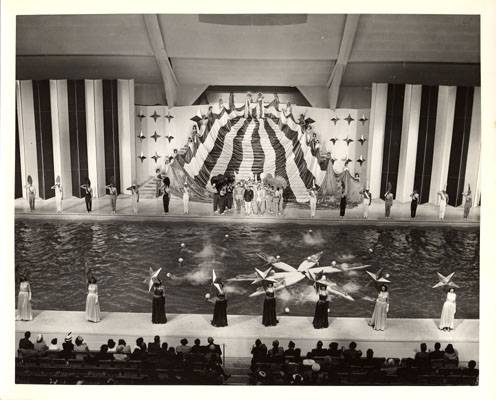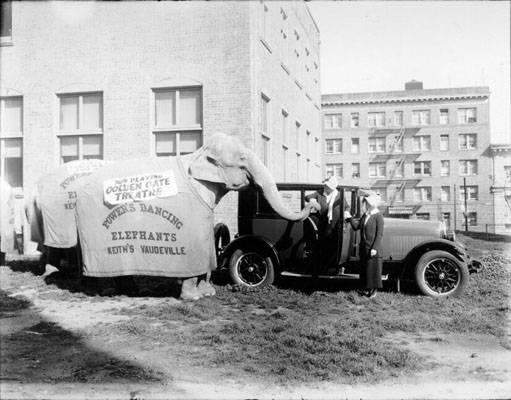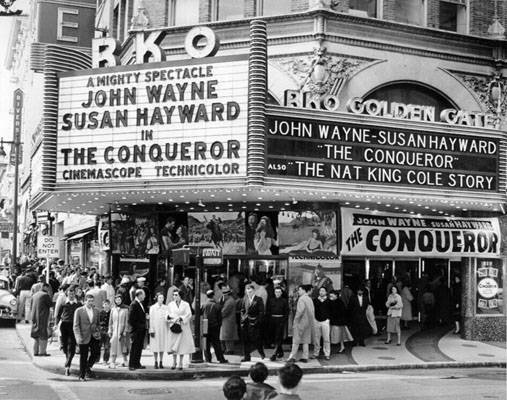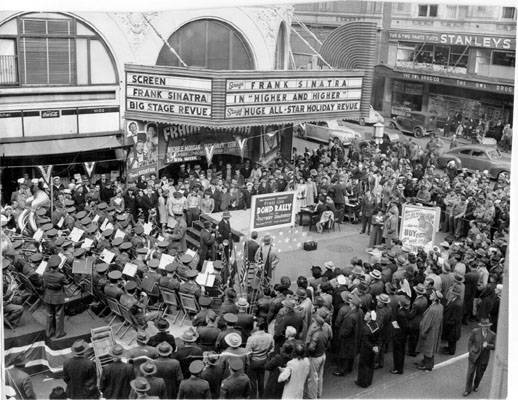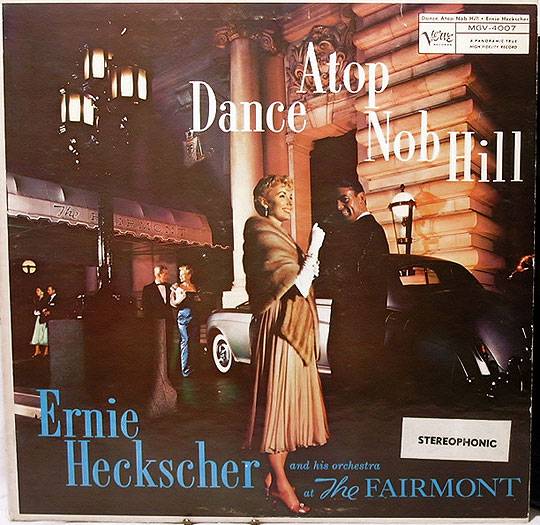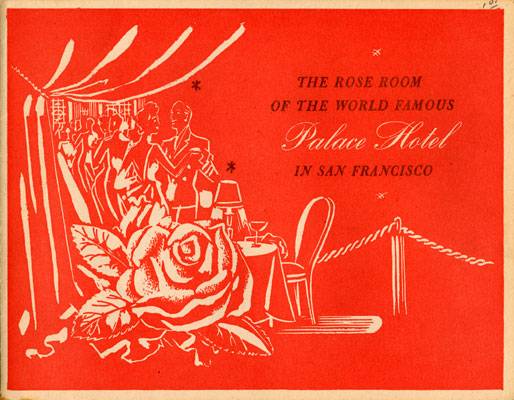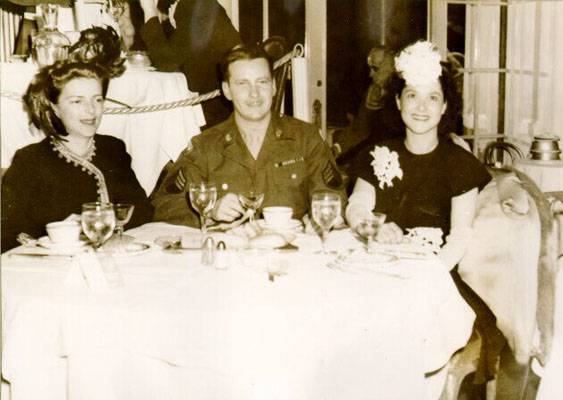Mel Lewis, Big Band Singer
"I was there..."
By W.M. “Mel” Lewis
McKinleyville, CA
In 1939, in San Francisco, I was 23 years old and I wanted to sing. I learned that Fred Waring, a famous band leader (and inventor of the Waring Blender) was holding auditions for his chorus which would appear at the Aquacade on Treasure Island. This was at the World's Fair due to open shortly. Famous swimmers such as Esther Williams and Johnny Weismuller would be appearing at times.
1940: Swimmers in Billy Rose's Aquacade at the Golden Gate International Exposition, Treasure Island.
Photo: San Francisco History Center, SF Public Library
I had my chance. I was handed a sheet of music, something I knew well and loved. "All the things you are." I started singing and hardly looked at the music. Unfortunately, part of it was in harmony. Waring straightened me out nicely but quickly. "You don't read music, do you" he said, rather than asked. I acknowledged this and was told that there would be a new show every week and the harmony had to be memorized. Not likely if one is unable to read the notes.
All was not lost. I tried Budda's Amateur Hour, held every Saturday night on KFRC on Van Ness Avenue. This was sponsored by the Marin-Dell Milk Company who awarded the winner with a watch and fifty dollars for appearing at the Golden Gate Theatre for a week. Any winner would have been happy to appear for nothing. Happily, I won and now had to audition for the job at the theatre. I sang for the Manager and Jay Brower, the band leader. They were satisfied that I could sing well enough to appear. This meant that my name appeared out in front along with the other vaudeville acts. Vaudeville has been gone for a lot of years so I should point out that the name of the Act appearing was displayed at each end of the stage, under glass, in lights.
Elephant advertises vaudeville act at Golden Gate Theater, Nov. 8, 1955.
Photo: San Francisco History Center, SF Public Library
I was of course filled with joy and with terror, as well. Jay Brower gave me a nice introduction when I first walked on stage, making me feel somewhat at ease. I sang "They wouldn't believe me," a beautiful song and the applause was generous. When I finished, Jay put his and on my shoulder and said: "That was very nice, Mel, but please do it once more and put more feeling into it." I sang it again, the same way as before but got even more applause, I think. Brower was an old Pro and we did this same routine three times a day all week long with a Midnight show on Saturday. The Public can be very very kind to an amateur and the audiences at the Golden Gate certainly were to me. It is surprising to me today that Management had me as the opening Act, following the dancing girls, of course.
1956: Golden Gate Theater marquee.
Photo: San Francisco History Center, SF Public Library
January 11, 1944, Bond Rally outside Golden Gate Theater.
Photo: San Francisco History Center, SF Public Library
The stage show was made up of 14 chorus girls who did well but were hardly Rockettes. I got to meet a few of them and they seemed to all have the same dream: To someday make it in ballet. There were four more Acts after mine, a married couple who danced nicely, two acrobats, a juggler and a magician. Later in the week I received a wonderful compliment from the couple who followed me. The man said: "You are harder to follow than a dog act."
The Midnight show on Saturday was the best. The theatre was full and the audience was wonderful. I was called back to sing another song and had to quickly pick one of the many Brower had in his library. I don't remember which it was and I do know that I wasn't pleased with the way I sang it but the audience didn't care.
Suddenly the week was over and I was unemployed. Fortunately, Ernie Heckscher telephoned and invited me to audition for him. Ernie had been playing for dances for several years and had become popular with college students and Marin county residents. He was such an accomplished musician that I supposed he had been around for years. It was more than fifty years later that he told me his age. He was a year younger than I! It was a wonderful step up for him to be appearing in the Rose Room of the Palace Hotel in San Francisco. This was his first week there and he was without a singer. I "tried out" at his band's rehearsal in the afternoon and then sang just one number with the band that evening. That half-hour was broadcast nationwide and I was limited to one song because a Mrs. Johnson who owned the Hotel had to approve before Ernie could hire me. I never did get to meet her and I don't know if she was present that evening or listening on the radio. Anyway, she approved.
Three patrons at the Rose Room, Palace Hotel, Sept. 7, 1945
Images: San Francisco History Center, SF Public Library
The next morning two fellows I had been going to Oakland with days to train to be a service station worker came by my house to pick me up. I told them Ernie had hired me. One of them said: "We heard you last night. You had better come to work with us." This was first time I heard the old "don't give up your day job."
Rehearsals were scheduled one afternoon each week because Publishers sent packages of orchestrations constantly. Ernie and his lead man would choose which they thought would "sell" and the band would go to work. This meant more words for me to memorize although I didn't get involved with many of the successful choices. I sang only the ballads, not fast numbers. I knew the words to most of the popular songs being played, thanks to "song sheets" which were published weekly. No notes appeared on these sheets, only the words. Thanks to radio, Bing Crosby and Rudy Vallee, everyone who could "carry a tune" knew the music.
The band had three violinists, all very attractive blonde women. I found over time that the identical dream these three had was to someday play in a Symphony Orchestra. All the men in the band had only one hope, continual work with no "casuals" in between. I learned to have the same hope. Casuals were the odd jobs played while waiting for better things to happen. I learned from these people and they all treated me as though I were a longtime Professional. We played from 8 p.m. until one o'clock in the morning every night except Monday. In addition there was a Tea Dance each Saturday afternoon. Usually each evening several of us, during a break would go through the Palace kitchen into the Pied Piper Room which was a beautiful cocktail lounge, for men only. We would have time for only one drink. I think they were fifty cents. Often, nearly all the men in the band would go to the Musician's Union downtown after we were finished at one A.M. These fellows would then enjoy playing with an abandon they couldn't consider at the Hotel. They would play "Honeysuckle Rose" for hours, it seemed to me. There was nothing for me to sing. I just watched. And loved it.
The second day I worked for Ernie he took me to the Musician's Union and I became a member. (Maybe the only one who couldn't read music.) Then he took me to MacIntosh Tailors on Powell where I was measured for a tuxedo. This would cost me $50 which was a lot but I was now making $86 per week. My last day job paid $90 per month. Another matter Ernie wanted me take care of was a gold capped molar which I had thought was out of sight but he insisted the spotlight caused a reflection which could sometimes be seen. I had the tooth recapped.
Nearly every musician I ever met had a day job. There were lots of periods of unemployment in the music business and only the band leaders seemed to be able to get by without working days. It was important to have a job which would allow you time off to be at rehearsals. These were hard to find so there was lots of switching from one day job to another.
A number of day jobs were lost when Heckscher arranged for a three week play at the Stateline Club at South Lake Tahoe. It was a gambling casino which later was torn down so that Harrah's could be built there. We played from nine P.M 'til two A.M. It was fairly easy because Management didn't want us to play often or long so that customers would spend their time at machines or tables. We played short "sets" with longer breaks. There was a floor show which caused great pain to everyone. Our band was not really a "show" band. This would be a group like that at the Golden Gate Theatre. Each week new Acts arrived, many with their own music and the band and the leader was expected to go slow, go fast, play loudly or not. Making the Act look good. Jay Brower had one rehearsal, the morning the new group was to open and that was all that was needed. Our band rehearsed with the Acts every day trying to do it right. Never accomplished that, so there were angry people around.
When we got back to the Bay Area we arrived just in time to play at a total of 13 debuts. Each one of these was elaborate and each one attempted to "out do" the preceding one. They were fun to perform at because the audience was always having such a good time. It seemed to me that those attending the first one were the ones who attended the last one. The men still wore the same tuxedos but the girls all wore different gowns. Expensive daughters. The last debut we played was that of the Roth twins at their home at Filoli, a magnificent place which is famous because of its beauty inside and the wonderful landscaping. It is open to the public these days having been given away by the Roth's.
The Tobin family owned the Clift Hotel in San Francisco and they agreed to put Ernie and the band in the Redwood Room at the Clift but with one condition. The band's vocalist had to be their daughter, Mimi. I never did hear her sing but I imagine she was very good. Ernie wanted me to wait by leading a second group of musicians playing casuals. These jobs were advertised as Ernie Hecksher's band playing but all Ernie could do was try to show up for a few minutes anywhere we played. So here I was, actually still an amateur, standing up in front of a band and leading it. The fellows were great about this. They of course paid no attention to me but nobody ever laughed. We all took turns driving together. Lots of equipment went along.
I received an offer from Joaquin Grill, an Oakland band leader and I accepted. Grill played casuals but he was very busy. A favorite place was Sweet's Ballroom in Oakland. There were lots of young people who only paid fifty cents to get in and they loved us. Grill would try things. For example, in his library was "Donkey Serenade" made famous by Allan Jones, father of Jack Jones. I could never have sung it as well as the father did but I could hit the notes because it was in the right key. Partway through the song there is a high note which has to be held for awhile and my problem was in not knowing when to stop and go on with the song. Grill solved it. At the right moment, every member of the band would shout "now" and I would quit that note and go on. Audiences loved it. Seemed to believe that the band was tired of my holding the note.
I had found a day job where my employer would allow me to take time off to attend rehearsals but as time went on, he had to tell me to decide what I wanted to do, sing or work for $160 per month. I had given a lot of thought to where I could possibly be singing when I got to be real old, like maybe, fifty. The only old singers in those days were the wonderful Opera Stars who were so talented and dedicated. Crosby was still young and Sinatra was just starting out, like me. I was 6'3" and not as confident as those two, especially Sinatra. Even Crosby seem to me to be embarrassed if he had to move his body. I made my decision and stayed with that fine Company. Only temporarily. I left them 39 years later.

